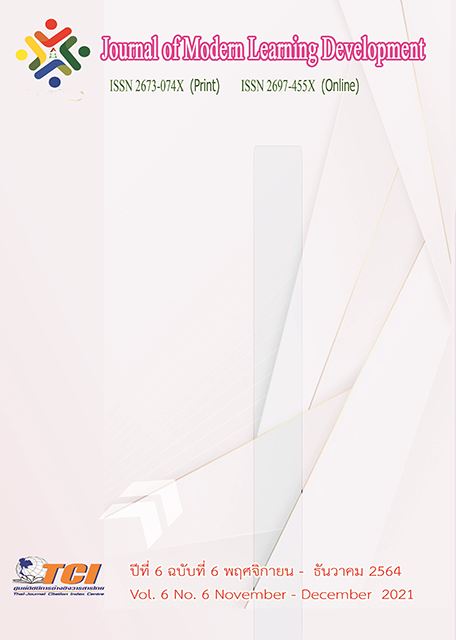Teaching English Vocabulary with Online Teaching Methods for Primary Grade Children
Main Article Content
Abstract
Teaching English vocabulary is essential for learning English subject. This is because vocabulary is an important basic unit of language leading to further learning in English courses.
The current situation of the coronavirus disease 2019 epidemic has resulted in schools needing to adjust the teaching style to suit the situation. Online teaching is an alternative form of teaching that many schools choose to use for learning activities.
Furthermore, teaching English vocabulary with online teaching methods have a plan for teaching and learning to cover the content according to the learning objectives. It must also take into account the age-appropriateness of the learners at the primary grade children. It should provide instruction that encourages the development of students physically, emotionally, socially and intellectually. An online learning platform should also be chosen that is consistent with the school context, considering the advantages and limitations of the programs or applications. Teaching methods as well as choosing a variety of teaching media to achieve good learning outcomes.
Article Details
References
จักรกฤษณ์ โพดาพล. (2563). การจัดการเรียนรู้ออนไลน์: วีถีที่เป็นไปทางการศึกษา. ออนไลน์. สืบค้นเมื่อวันที่ 8 ตุลาคม 2564. แหล่งที่มา: https://pubhtml5.com/gqxf/yatn/basic
ฐิติมา ชาลีกุล. (2564). สพฐ. แจงเลือกวิธีเรียนได้หลายแบบหากไม่พร้อมเรียนออนไลน์. ออนไลน์. สืบค้นเมื่อวันที่ 8 ตุลาคม 2564. แหล่งที่มา: https://www.obec.go.th/archives/377135
ธีร์วรา ปลาตะเพียนทอง. (2562). การพัฒนาผลสัมฤทธิ์การเรียนรู้ด้านคำศัพท์และความคงทนโดยใช้เทคนิคช่วยจำร่วมกับสมุดภาพคำศัพท์สำหรับนักเรียนชั้นประถมศึกษาปีที่ 6 โรงเรียนอนุบาลนครปฐม. การค้นคว้าอิสระ สาขาวิชาการสอนภาษาอังกฤษ ภาควิชาหลักสูตรและวิธีสอน. บัณฑิตวิทยาลัย: มหาวิทยาลัยศิลปากร
ยศวีร์ สายฟ้า. (2555). แนวการปฏิบัติที่เหมาะสมตามพัฒนาการ (Developmentally Appropriate Practice) ในชั้นเรียนระดับประถมศึกษาตอนต้น: จากกรอบแนวคิดทฤษฎีสู่หลักการปฏิบัติที่เหมาะสม. วารสารครุศาสตร์. 34 (2), 120-129.
รัชนี นิธากร และคณะ. (2561). การจัดการเรียนรู้ด้วยกิจกรรมเสริมประสบการณ์ด้านทักษะทางวิทยาศาสตร์ “Learn Science by Practice” สาระการเรียนรู้วิทยาศาสตร์ชั้นประถมศึกษา ปีที่ 4-6 โรงเรียนบ้านเขาน้ำเพชร อำเภอเมือง จังหวัดกำแพงเพชร. วารสารมนุษยศาสตร์และสังคมศาสตร์. 24 (1), 113-128.
วิจารณ์ พานิช. (2558). วิถีสร้างการเรียนรู้เพื่อศิษย์ในศตวรรษที่ 21. วารสารนวัตกรรม การเรียนรู้ มหาวิทยาลัยวลัยลักษณ์. 1 (2), 3-14.
วินัดดา ปิยะศิลป์. (2548). คู่มือการเลี้ยงลูก ตอน วัย 6-12 ปี. กรุงเทพมหานคร: สถาบันสุขภาพเด็กแห่งชาติมหาราชินี กรมการแพทย์.
ศูนย์เทคโนโลยีสารสนเทศและการสื่อสาร. (2562). ทักษะการเรียนรู้ในศตวรรษที่ 21. ออนไลน์. สืบค้นเมื่อ 12 ตุลาคม 2564. แหล่งที่มา: http://www.bict.moe.go.th/2019/index.php?option
=com_content&view=article&id=342:21&catid=51&Itemid=372
สมบัติ คชสิทธิ์ และคณะ. (2560). การจัดการเรียนรู้ให้กับผู้เรียนยุค Thailand 4.0. วารสารวไลยอลงกรณ์ปริทัศน์ มนุษยศาสตร์และสังคมศาสตร์. 7 (2), 175-186.
สำเนา ศรีประมงค์. (2547). การศึกษาผลการใช้เกมคำศัพท์ประกอบการสอนที่มีต่อความคงทนในการเรียนรู้คำศัพท์ภาษาอังกฤษของนักเรียนชั้นประถมศึกษาปีที่ 5 โรงเรียนอัสสัมชัญระยอง. ปริญญานิพนธ์ศิลปศาสตรมหาบัณฑิต. สาขาวิชาการสอนภาษาอังกฤษในฐานะภาษาต่างประเทศ. บัณฑิตวิทยาลัย: มหาวิทยาลัยศรีนครินทรวิโรฒ.
อดุลย์ วังศรีคูณ. (2557). การศึกษาไทยในศตวรรษที่ 21: ผลผลิตและแนวทางการพัฒนา. วารสารมนุษยศาสตร์และสังคมศาสตร์ บัณฑิตวิทยาลัย มหาวิทยาลัยราชภัฏ พิบูลสงคราม. 8 (1), 1-17.
อนุภาพ ดลโสภณ. (2542). การเปรียบเทียบผลสัมฤทธิ์ทางการเรียนวิชาภาษาอังกฤษของนักเรียนชั้นประถมศึกษาปีที่ 5 ระหว่างการสอนโดยใช้เกมและการสอนตามคู่มือครู. วิทยานิพนธ์การศึกษามหาบัณฑิต. บัณฑิตวิยาลัย: มหาวิทยาลัยมหาสารคาม.
Bishop, A., Yopp, K., and Yopp, H. (2009). Vocabulary instruction for academic success. CA: Shell Education.
Gagne, R. M. (1970). Learning Theory, Educational Media, and Individualized Instruction.
Johnson, P. (2009). The 21st century skills movement. Educational Leadership, 67 (1), 11.
JiraponBarisri, S. S., Masarakham, N. P. N., Rachjuntu, P., Sukperm, K., & Kenaphoom, S. (2021). Teaching and Learning through Using of Online Applications during the Covid Situation 2019, Roi Et Rajabhat University, Thailand. Annals of the Romanian Society for Cell Biology. 25 (6), 3056-3063.
Nation. I S P. (2003). Learning vocabulary in another language. Cambridge: Cambridge University Press.
Thornbury, S. (2004). How to teach vocabulary. Bangkok: Pearson Education Indochina Ltd.


